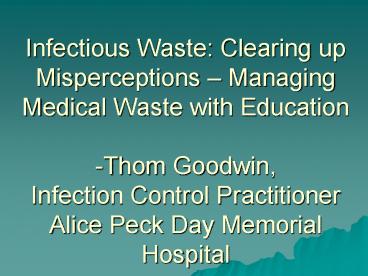Infectious Waste: Clearing up Misperceptions - PowerPoint PPT Presentation
1 / 21
Title:
Infectious Waste: Clearing up Misperceptions
Description:
cardboard. paper. confidential paper. metal. aluminum. plastic. pvc, hdpe, pet, ldpe, pp, ps,other ... Elimination of the manufacturing of 67 corrugated boxes annually ... – PowerPoint PPT presentation
Number of Views:51
Avg rating:3.0/5.0
Title: Infectious Waste: Clearing up Misperceptions
1
Infectious Waste Clearing up Misperceptions
Managing Medical Waste with Education -Thom
Goodwin, Infection Control PractitionerAlice
Peck Day Memorial Hospital
2
(No Transcript)
3
(No Transcript)
4
Infectious Medical Waste
5
- Medical waste shall be considered capable of
producing an infectious disease if - it has been, or is likely to have been,
contaminated by an organism likely to be
pathogenic to healthy humans, - if such organism is not routinely and freely
available in the community, AND - such organism has a significant probability of
being present in sufficient quantities and with
sufficient virulence to transmit disease.
6
Infectious Wastes Specifically Are
- Blood and blood products in a free flowing,
unabsorbed state - Contaminated sharps,
- Isolation Wastes,
- Laboratory wastes, and
- Unfixed pathological tissues
7
Bloodborne Pathogen Standard
- Defines Infectious Medical Waste as
- Contaminated items that would release blood or
OPIM in a liquid or semi-liquid state if
compressed, - Liquid or semi-liquid blood or other potentially
infectious materials (OPIM), - Items caked with dried blood or OPIM that would
dislodge during handling, - Contaminated sharps, and
- Pathological and microbial wastes containing
blood or OPIM
8
Routinely Over Classified Items
- Diapers (adult and baby)
- Paper towels
- Unsaturated dressings and chucks
- Wrappers and packaging
- IV bags and oxygen tubing
- Gloves with no visible contamination
- Urine catheters and bags
- Paper, newspapers, and food containers
- Urine cups and specimen containers with no
visible blood - Empty Medication vials and broken glass
9
- When you mix infectious waste and regular solid
waste together, you are not permitted to separate
them
- Once combined, the entire contents are considered
infectious waste!
10
Waste Streams
11
Recyclable Waste cardboard paper confidential
paper metal aluminum plastic pvc, hdpe, pet,
ldpe, pp, ps,other glass medical,
sodalime wood construction demo food kitchen
grease
Solid Waste
Biohazard Waste Sharps Blood/blood
products Pathological Trace Chemo Animal
carcasses
Hazardous Waste chemical hazards solvents U P
listed pharmaceuticals cytotoxics lead silver merc
ury ether
Universal Wastes Batteries Fluorescent light
tubes Mercury switches Pesticides
12
Hospital Solid Waste
- Paper waste
- Plastic waste
- Glass waste
- Metal waste
- Food waste
- Wood waste
- Other waste
glass
wood
other
paper
metal
food
plastic
13
- The myth that burning makes waste disappear has
lead to incineration emerging as a widely used
method for disposing many kinds of waste,
including hazardous wastes.
14
- Incineration is a method where industry can
break down its bulk waste and disperse it into
the environment through air, water and ash
emissions. It is a convenient way for industry to
mask today's waste problems and pass them onto
future generations. - -Greenpeace International
15
- Source Reduction - ways to lessen the amount of
material - Segregation - keeping noninfectious waste out of
the infectious waste stream - Minimization - reduce or eliminate waste at the
source--------PACKAGING - Appropriate use of disposables
- Engineering controls - methods to reduce quantity
of waste - (smaller containers, accessibility, etc)
16
(No Transcript)
17
Bio Systems, an Environmentally Friendly Sharps
Management Program
18
- KEEPING WASTE OUT OF LANDFILLS.
- Bio Systems Sharps Management Program uses FDA
compliant reusable sharps containers thus
reducing the volume of waste generate and
disposed of via landfill. That means that every
time you use one of Bio Systems sharps containers
you are doing something good for the Environment.
- Each container is tracked with a barcode that
counts the number of uses. After 500 uses, or if
the container is damaged in any way, the
container is put through the ETD process and is
used to generate energy at American Re-Fuel.
19
- ELECTRO-THERMAL-DEACTIVATION.
- Our proprietary Electro-Thermal Deactivation
(ETD) technology is making news around the
industry.and around the globe! - Stericycles patented proprietary ETD technology
uses an oscillating energy field of low-frequency
radio waves to heat regulated medical waste to
temperatures that destroy pathogens without
melting the plastic content of the waste. This
provides a competitive advantage in international
markets, because the process does not create any
regulated air or water emissions, and it enhances
the ability to recycle plastic materials.
20
- WASTE TO ENERGY.
- Since the ETD processing technique renders waste
non-recognizable and non-infectious, it could be
dumped into a landfill, however Stericycle sends
the waste to American Re-Fuel to turn it from
waste to electricity. That means about 1.5
million pounds of waste is eliminated from
landfills a month. That represents 18 million
pounds per year. - For more information on America Re-Fuel go to
www.re-fuelamerica.com
21
- IMPACT SUMMARY
- Elimination of the manufacturing of 737 plastic
disposable containers - Elimination of the manufacturing of 67
corrugated boxes annually - Elimination of the excessive and recurring
transportation of disposable sharps containers - Elimination of 737 plastic containers from the
landfill - Elimination of the plastic, metal glass
contents from the landfill































